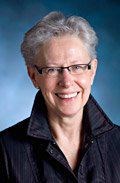B.C. Teachers Federation president Susan Lambert wants to see more issues negotiated at the local level, saying the move would reduce the number of costly grievances and arbitrations.
Asked for an example particularly important to School District 57, Lambert said the mix of rural and urban schools requires a locally-reached solution in terms of posting and filling jobs.
"If a position becomes vacant, for example, in an inner city school as opposed to a much more rural school, that's going to have implications for your employees in the district," noted Lambert, who was in Prince George Wednesday to meet with teachers.
"You'd have to drive a long way to get to that rural school or you'd have to prepare to deal with the challenges of an inner-city school.
"All of those kinds of nuances or complexities are only known by the people in Prince George and so, the post and fill language should be designed by the employers and employees at that local bargaining table to best suit the conditions in Prince George."
"Big ticket items" like salaries, benefits, hours of work and paid leave should remain at the provincial table, Lambert said. Beyond that, she said most other issues -- seniority rights, professional development, aboriginal employment equity agreements and teacher on-call issues -- should be dealt with locally.
"Everything else, we think, should be bargained at the local table," Lambert said.
Agreements reached between school districts and teachers associations at the local level will lead to fewer disagreements, Lambert maintained.
"At the local table you have the two parties who are going to live with whatever agreement they come to," she said. "They are the people who are the most knowledgeable about the complexities of whatever problem they're going to solve."
Negotiations with the B.C. Public School Employees Association (BCPSEA), the provincial government's bargaining agent in the sector, are ongoing but the current contract ends June 30 and Lambert said there is a "great divide" on salaries.
BCPSEA is sticking to a "net zero" mandate in which public sector agreements should be for two years and provide no net increase in costs while the BCTF is seeking a 12.5 to 20 per cent salary increase to bring their pay into line with teachers elsewhere in the country.
In 2006, teachers were ranked third in Canada but have since slipped to eighth, according to the BCTF.
A teacher in Prince George can earn a top rate of $81,469 compared to $79,633 in Vancouver. In Edmonton the top rate is $91,213, in Calgary it's $90,944 and in Toronto it's $89,644.
Lambert argued the provincial Liberal government got itself into its deficit woes by slashing income tax 25 per cent upon first taking office and asserted most taxpayers are willing to pay more to maintain and improve key services.
"I think high-quality public education is a wise investment and I think most British Columbians believe that too," she said.
School board chair Lyn Hall did not return a request for comment Wednesday.



